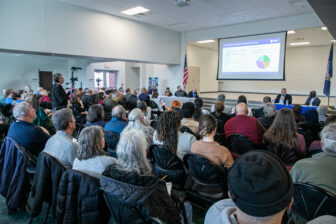For Immediate Release
February 7, 2013
Contact:
Kelly Trout, 240-396-2022, kelly@chesapeakeclimate.org
Mike Tidwell, 240-460-5838, mtidwell@chesapeakeclimate.org
Moratorium bill introduced in the House of Delegates on the heels of Baltimore City Council vote to freeze fracking process in Maryland
ANNAPOLIS—Maryland legislators today unveiled a new, three-point plan to establish a moratorium on hydraulic fracturing – or fracking – for natural gas in the state. The legislation introduced today comes in the wake of new federal studies highlighting potential harm from fracking and on the same week that the Baltimore City Council voted to endorse a fracking moratorium.
“This 18-month moratorium legislation will give the Governor’s Executive Order the full force of law and will protect against any immediate pressure to drill upon completion of the first round of state studies,” said Delegate Heather Mizeur (Dist. 20), the lead sponsor of the moratorium bill introduced today in the House of Delegates. “And, this legislation will ensure the General Assembly’s role in reviewing the study results before any final drilling decisions are made.”
The moratorium bill – SB 601 – includes three key features endorsed by a broad coalition of legislators, environmental groups, health officials, western Maryland land owners, and others. The bill would create an immediate moratorium on all drilling activities until and unless the following three features are accomplished:
1) All fracking safety and health studies called for in Gov. Martin O’Malley’s 2011 executive order are completed, including special risk assessments similar to a European Commission approach released last fall.
2) An 18-month span of time must have passed after the completion of the studies to give the General Assembly and public at large appropriate time to digest and understand the results of the studies and risk assessments.
3) The Department of the Environment must adopt regulations that are specific to fracking and that implement the findings and recommendations of the study.
The co-lead sponsors of SB 601 are Baltimore County Senator Robert Zirkin (Dist. 11) and Montgomery County Senator Jamie Raskin (Dist. 20).
“The Governor posed an important series of safety questions with his fracking executive order in 2011,” said Senator Jamie Raskin (Dist. 20). “This bill creates a reasonable moratorium until we can answer those questions and assure public safety and health will not be harmed by this drilling process.”
Baltimore City Council member Bill Henry joined House Delegates and Senators at a press conference in Annapolis today to declare the City Council’s explicit support for the moratorium bill, as expressed in the Council’s unanimous resolution endorsing the bill earlier in the week.
“This is a common-sense approach to this controversial drilling method,” said Mike Tidwell, director of the Chesapeake Climate Action Network. “We now have more support for this reasonable legislation than ever, from all across the state.”
Drilling activity related to hydraulic fracturing – or fracking – has been directly linked to a whole host of harmful effects including contaminated streams and rivers, flammable tap water, forest fragmentation, and poor air quality. Underground re-injection of fracking wastewater, meanwhile, is strongly suspected to be the cause of a large increase in earthquakes across the central United States, including in nearby Ohio. Fracking also contributes to climate change through the documented release of methane gas in the drilling process and from emissions of planet-warming CO2 upon combustion.
To date, this controversial drilling technique has not occurred in western Maryland, but large areas of western Maryland land have been leased by companies with the intent to frack for natural gas. Maryland Governor Martin O’Malley issued an executive order in 2011 establishing a special commission to determine if and how fracking activity could be conducted safely in the state. The Governor recently included $1.5 million in funding for the studies in his budget request. It is unclear if this is sufficient for the full studies needed to give the Maryland General Assembly the information it needs to make a properly informed decision about the future of fracking in Maryland.
While some have characterized the 2011 O’Malley executive order as a de facto moratorium, the reality is that there are few real legal protections in place to prevent issuing a fracking permit if the state were challenged by the oil and gas industries.
Moratorium proponents emphasized today that it’s time for the policy of the state of Maryland to be clarified in the law: no fracking until the studies are completed and the overall risks of fracking are weighed and assessed so that the total cumulative impact of fracking activities can be fully understood.
Read SB 601, the “Maryland Hydraulic Fracturing Moratorium and Right to Know Act of 2013.”
See the Baltimore City Council resolution in support of the moratorium bill.
Read a one-page overview of the fracking moratorium bill introduced in Annapolis.
###





